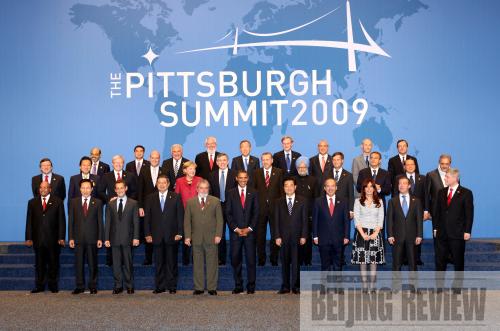|
 |
|
A SUMMIT ASCENT: G20 leaders pose at their third summit in Pittsburgh, the United States, on September 25 (XINHUA) |
Pittsburgh has a history of battling recession. The collapse of the steel industry in the 1970s brought Pittsburgh's economy down with it. Since then, however, Pennsylvania's second biggest city has rebounded with help from sectors including health care, education, technology and financial services.
In fact, the city of 300,000 people now ranks among the most livable in America.
And on September 24 and 25, when leaders of the world's 20 largest economies convened there, they only heard about Pittsburgh's success story—but, more importantly, tried to come up with a similar roadmap for global economic recovery and sustainable growth.
This was the third meeting for the leaders of the Group of 20 (G20) nations, which represent 85 percent of the global economy's output, in the past year.
The first G20 leaders' gathering to deal with the world financial crisis took place in Washington, D.C. last November. The Washington summit was a success in that it achieved a general agreement on the root causes of the crisis as well as cooperation in strengthening economic growth.
Against the backdrop of the fast-spreading economic deterioration, the London summit that followed in April this year reached an agreement calling for the reform of the international banking system. It also called for the injection of $1.1 trillion to various programs designed to tackle the economic downturn and promote recovery.
In Pittsburgh, the United States presented its guests a backdrop of a place that has emerged from the depths of a severe economic slump to a vibrant economy. Amid this calm atmosphere these leaders reviewed the recovery progress made since the London summit and discussed ways to move forward.
It is important for leaders of major economies to discuss global development at a period punctuated by slow growth, Steven Dunaway, an adjunct senior fellow for international economics at the U.S. Council on Foreign Relations told Beijing Review.
The third G20 summit was needed, as "the process of recovery and repair remains incomplete," said the 23-page Leaders' Statement issued at the meeting's end.
"We cannot rest until the global economy is restored to full health," said the statement, "and hard-working families the world over can find decent jobs."
Imbalance
Addressing global imbalances would be a priority at the G20 summit, stressed U.S. President Barack Obama before he arrived in Pittsburgh.
"We can't go back to the era where the Chinese or the Germans or other countries just are selling everything to us," said Obama during an interview with CNN on September 20.
Rebalancing the Chinese economy has been the subject of debate for a long period of time, said Dunaway. Early in the aftermath of the financial crisis last year, some economists and officials, including former U.S. Treasury Secretary Henry Paulson, said economic imbalances were largely to blame for the global crisis.
Moreover, they said, these ranged from high savings and massive trade surpluses in countries like China, to high consumption and trade deficits in countries like the United States.
"This is the reality of imbalance, but it's not the main reason that led up to the financial crisis," said Ma Xin, Director General of the International Cooperation Department at China's National Development and Reform Commission, at a news briefing held by the Chinese delegation to the G20 summit on the sidelines of the summit.
Ma said there are other imbalances in the world, like the imbalance of wealth distribution, imbalance of development and imbalance of international payments.
He added that China's low rate of consumption is a structural problem that has accumulated over many years. Moreover, he said the nation is aware of the problem and has spared no effort in expanding domestic demand and stimulating consumption.
| 